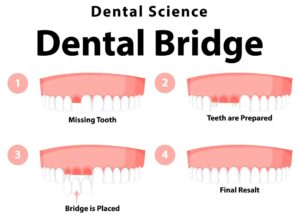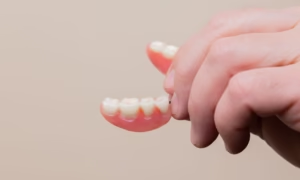A prosthodontist is a dental professional with advanced training and is dedicated to improving patients’ oral health, function, and aesthetics.
Prosthodontics is a specialized field of dentistry that focuses on the restoration and replacement of teeth, oral tissues, and facial structures.
What is the difference between a prosthodontist and a dentist?
A prosthodontist is a dentist who completed dental school and has years of extended training in several areas of restorative dentistry.
A prosthodontist trained in technical and technological aspects of creating complex dental prosthetics(artificial teeth).
Also, a prosthodontist is specialized in cosmetic dentistry.
A general dentist is a primary dental care provider who offers routine dental check-ups and basic restorative treatments such as fillings.
What is the difference between prosthodontists and periodontists?
Prosthodontists focus on the restoration of teeth and sleep disorders associated with the mouth.
While periodontists focus on the diagnosis, treatment, and prevention of diseases that affect structures around teeth, gums, and alveolar bones(the bones that surround and support teeth).
What is the role of a prosthodontist?
Prosthodontist is involved in various aspects of dental care and the visits to prosthodontists include:
- Diagnosis of oral health issues and create personalized treatment plans.
- Creates precise models of teeth and jaws for accurate appliance design.
- Tooth preparation for crowns or bridges if necessary.
- Designs, constructs, and fits prosthetic devices to ensure optimal fit, function and aesthetics.
- Provides ongoing care to maintain the health and longevity of the prosthetic restoration.
What services does the prosthodontist provide?
A prosthodontist plays an important role in improving a patient’s oral health, function, and aesthetics. Their expertise provides a wide range of treatments, including:
Dental crowns
Is a restoration that covers damaged or weak teeth, it may also be used if you have extensively decayed or cracked teeth.
Dental bridges
Used to replace one or more missing teeth with artificial teeth fixed firmly to the adjacent natural teeth.
Dentures
Dentures are removable appliances that replace missing teeth, and help to restore function and appearance of your smile.
Dentures can be partial or complete.
Partial dentures are used to replace sporadically missing teeth relying on existing teeth or implants for support, while complete denture replaces all teeth in an upper or lower arch.
Oral appliances
Custom devices are used for various oral health issues including, sleep apnea(stop breathing during sleep), teeth grinding, and snoring.
Veneers
They are thin tooth-colored shells attached to the front surface of teeth to improve their appearance.
Veneers can be used to treat cracked, broken, discolored, and smaller-than-average teeth.
Maxillofacial prosthetics
A maxillofacial prosthodontist is a specialist in the treatment of patients with congenital(birth) defects usually related to cleft lip and palate.
Acquired defects due to diseases such as cancer of the mouth or face and neurological defects such as stroke
Also, maxillofacial prosthodontists can deal with dental problems that involve missing teeth and their surrounding tissues.
Inlays and Onlays
The custom restoration is used for teeth that are too damaged for filling but not enough to put crowns.
Why do we need a prosthodontist?
You should see a prosthodontist when you have any of the following conditions:
- Cosmetic concerns(if you want to enhance your smile’s appearance).
- Missing teeth due to accidents or aging.
- Damaged teeth or worn teeth(from trauma, decay, grinding(bruxism), or erosion).
- If you need to restore smile function and appearance.
- If you have snoring problems.
- If you have temporomandibular problems or disorders( conditions that affect jaw movement).
How to choose a prosthodontist?
Choosing a qualified prosthodontist is essential for optimal outcomes, so
You need to consider the following factors when choosing a prosthodontist:
- Experience and qualification.
- A good prosthodontist will explain treatment options, and risks and be if it’s in simple terms.
- Dental laboratory relationships or on-site laboratory to ensure high-quality prosthetic appliances.
- Reviews and feedback from previous patients can provide valuable insights.
- Technology and facilities(advanced equipment, sterilization, and hygiene).
- Insurance coverage (check if your dental insurance covers prosthodontic treatment).
Advances in prosthodontics
The field of prosthodontics continues to evolve with technological development. These advancements have significantly improved the lives of patients with missing teeth or facial deformities, some of these late innovations include:
-
Computer-aided designs (CAD) and computer-aided manufacturing(CAM).
These technologies allow the accurate and efficient creation of prosthetic
applications, and also the reduction of treatment time.
-
Implant overdentures:
These dentures are attached to the dental implants to improve their stability
and retention.
-
Advanced materials:
New materials developed to provide more durability and biocompatibility of
dental restorations.
- Zirconium oxide offers strength, durability, and a natural-looking aesthetic, so it is an excellent choice for crowns and bridges.
- Composite resin advancement in composite materials has led to improved strength, color stability, and wear resistance.
-
Digital impressions:
This technology eliminates the need for traditional and uncomfortable
impression materials, resulting in a more comfortable and accurate process.
The future of prosthodontics
The future of prosthodontics will be characterized by greater customization thanks to
artificial intelligence(AI).
AI can analyze patients’ oral anatomy, and recommend the most suitable materials, designs, and manufacturing techniques for the prosthesis.
These techniques and technologies are developed to improve the quality and longevity of prosthetic restoration.
The future of prosthodontics research will involve replacing the lost tissues with biomaterials that are strong and more computable.
The bottom line prosthodontist is considered the artist who creates beautiful and functional restoration of your teeth and smile. This restoration enhances oral health, function, and aesthetics.
So choosing a qualified and expert prosthodontist helps you to obtain proper oral care and achieve a beautiful and long-lasting functional smile.
References








